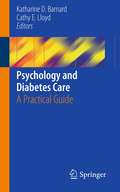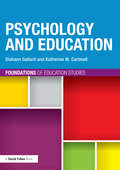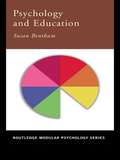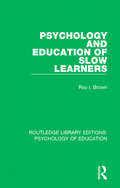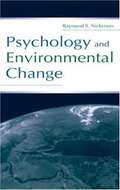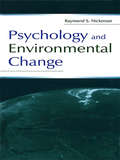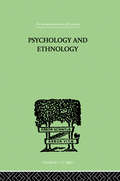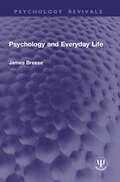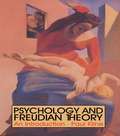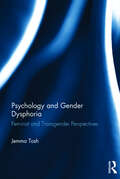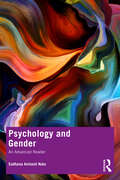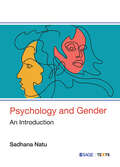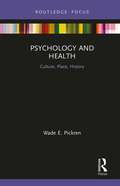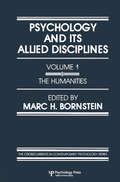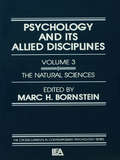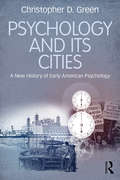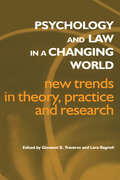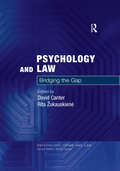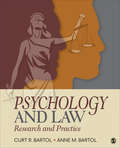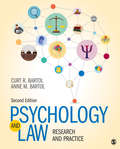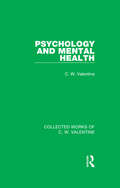- Table View
- List View
Psychology and Diabetes Care
by Katharine D. Barnard Cathy E. LloydPsychology and Diabetes Care: A Practical Guide is a concise handbook for the practicing diabetes clinician who is interested in gaining a better understanding of his patients, and in learning simple skills and tips to manage patients more effectively. It identifies and explores key psychological interventions in diabetes care in order to help healthcare professionals support their patients effectively. Edited by an expert on the psychology of diabetes, and with contributions from a group of specialists in diabetes psychology, this book contains a myriad of insights into how to understand and treat the type 1 or type 2 diabetes patient.
Psychology and Education (Foundations of Education Studies)
by Diahann Gallard Katherine M. CartmellThere are a number of psychological themes which are key to really understanding education: for example, the internal processes of learners, the nature of learning in culture and the influences on teaching and learning. Written specifically for education studies students, Psychology and Education is an accessible text that offers a clear introduction to educational psychology on education studies programmes. It considers the key psychological ideas that will support students' understanding of how different individuals and groups of individuals learn and behave in educational contexts and settings. Looking at factors that influence learning and attainment, the book discusses themes such as the relationship between cognition and emotion, emotional intelligence and motivation. Throughout, the emphasis is on encouraging the reader to avoid stereotyping, attributions and rigid views of learner ability. Features include: a focus on only the most relevant psychological themes case studies to exemplify key points extended research tasks reflection points. Part of the Foundations of Education Studies series, this timely textbook is essential reading for students coming to the study of educational psychology for the first time. It will ensure that undergraduate students are confident and competent with core psychological ideas related to education and help them to understand how different individuals learn and behave in educational contexts and settings.
Psychology and Education (Routledge Modular Psychology)
by Susan BenthamPsychology and Education provides a user-friendly introduction to educational psychology. The book covers psychological theories and their practical applications in education. Susan Bentham has written an ideal guide to this topic for students studying the OCR A-Level specification. The book will also be relevant to those studying the EdExcel specification and to those with a general interest in education and learning. The book covers the cognitive, behaviourist and humanistic perspectives on learning, including the work of Piaget, Vygotsky, Bruner and others, and describes the practical applications of these theories. The assessment of educational performance is covered and the cultural and developmental factors affecting performance are discussed. Chapters on the special educational needs of the educationally disadvantaged and gifted, and disruptive behaviour in school are included, with sections on ADHD, autism and dyslexia. The book also discusses teaching and learning styles, and the design and layout of educational environments.Psychology and Education requires little or no background knowledge and makes an ideal introduction for students of psychology, trainee teachers, child carers and anyone who is interested in what is happening in today's schools.
Psychology and Education of Slow Learners (Routledge Library Editions: Psychology of Education)
by Roy I. BrownOriginally published in 1976, this introductory text for those intending to work with slow learners was concerned with the practical implications of recent British and North American research in the field of psychology and education at the time. Slow learners are young people who for a variety of reasons, continuously or for long periods, under-function in terms of intelligence, educational attainment and social skills. This book offers a clear analysis of the problems facing slow learners, their psychology and the types of education open to them. Dr Brown reassesses the needs of disabled children and adults in the context of their families, with the emphasis on the practical level of activity and training possible for them. The aim is the integration of the disabled person in society, and the belief is that services for the disabled should be integrated, with no professional person working on an isolated basis, but as part of a multidisciplinary professional team. Design for individuals entering the field of teaching, particularly those concerned with special education, training and rehabilitation programmes, the book should also be of value to social workers, psychologists and other professional people working in the field, as well as to parents of disabled children.
Psychology and Environmental Change
by Raymond S. NickersonThis book will present the argument that psychologists have much to offer to the goal of stemming environmental change by reviewing the evidence on the prob of environmental deterioration as well as human behavior's contribution to the problem.
Psychology and Environmental Change
by Raymond S. NickersonThis book stimulates thinking on the topic of detrimental environmental change and how research psychologists can help to address the problem. In addition to reporting environmentally relevant psychological research, the author identifies the most pressing questions from an environmental point of view. Psychology and Environmental Change: *focuses on ways in which human behavior contributes to the problem; *deals with the assessment and change of attitudes and with studies of change of behavior; *proposes ways in which psychological research can contribute to making technology and its products more environmentally benign; and *introduces topics such as consumption, risk assessment, cost-benefit and tradeoff analyses, competition, negotiation, and policymaking, and how they relate to the objective of protecting the environment.
Psychology and Ethnology (International Library Of Psychology Ser. #Vol. 36)
by W H RiversFirst published in 1999. Routledge is an imprint of Taylor & Francis, an informa company.
Psychology and Everyday Life (Psychology Revivals)
by James BreeseOriginally published in 1971, Psychology and Everyday Life was intended to bridge the gap between the expert and lay use of the word ‘psychology’ at the time. The organisation and presentation of subject matter in this introductory book was prompted by a series of discussion lessons with sixth formers and lectures to students in colleges of further education – thus the topics presented here in the main represent problems raised by the students in open-ended lessons and discussions. Today it can be read in its historical context.
Psychology and Freudian Theory: An Introduction
by Paul KlineThis is a clear and accessible introduction to Freudian theory and its status in modern psychology. Paul Kline examines the evidence for and against psychoanalytic theories and shows that, far from being out of date, they can be supported by modern psychological research. He writes for the student and the non-specialist, drawing on numerous, often lighthearted, examples taken from real life and pointing to the implications of his findings for educational, clinical and industrial psychologists.After a brief introduction to Freudian theory and its development through the work of Jung, Adler and Melanie Klein, Paul Kline describes the objections that have been raised to psychoanalytic theories and some possible answers Important aspects of Freudian theory concerning child development, the Oedipus complex, dreaming and the nature of the unconscious are examined to see whether they can be said to be true or false, and are compared when possible with their modern psychological counterparts. The book concludes with a discussion of the broader social implications of Freudian theory and its value for those concerned with child development - parents and educators - and for those involved in mental health.Psychology and Freudian Theory will be welcomed by all those with an interest in human behaviour and by the wide spectrum of social studies students.
Psychology and Gender Dysphoria: Feminist and Transgender Perspectives
by Jemma ToshPsychiatry and psychology have a long and highly debated history in relation to gender. In particular, they have attracted criticism for policing the boundaries of ‘normal’ gender expression through gender identity diagnoses, such as transvestism, transsexualism, gender identity disorder and gender dysphoria. Drawing on discursive psychology, this book traces the historical development of psychiatric constructions of ‘normal’ and ‘abnormal’ gender expression. It contextualizes the recent reconstruction of gender in the 5th edition of the Diagnostic and Statistical Manual of Mental Disorders (DSM-5) and its criteria for gender dysphoria. This latest diagnosis illustrates the continued disagreement and debate within the profession surrounding gender identity as ‘disordered’. It also provides an opportunity to reflect on the conflicted history between feminist and transgender communities in the changing context of a more trans-positive feminism, and the implications of these diagnoses for these distinct but linked communities. Psychology and Gender Dysphoria examines debates and controversies surrounding psychiatric diagnoses and theories related to gender and gender nonconformity by exploring recent research, examples of collaborative perspectives, and existing feminist and trans texts. As such, the book is relevant for postgraduate and postdoctoral researchers of gender, feminism, and critical psychology as well as historical issues within psychiatry.
Psychology and Gender: An Advanced Reader
by Sadhana Avinash NatuThis book provides an understanding of how psychology and gender are closely interrelated. It examines, critiques, and debunks some of the theoretical premises from mainstream psychology while remaining mindful and respectful of their utilities. The book brings together psychological concepts, theories, and paradigms and examines how they interplay with gender studies going beyond the typical understanding of gender as merely demographic variable. The volume discusses important concepts such as gender role development and interpersonal relationships across caste, class, genders, sexualities, race, and region. It also studies the significant link between psychology and gender and with feminism, women’s studies, the women’s movement, the queer movement, queer studies, as well as other social movements. It uses an interdisciplinary and multidisciplinary approach all through. This book will appeal to students, researchers, and teachers of psychology, applied psychology, gender and women studies, sociology, practitioners, activists, those working in not-for-profit organizations and those working specifically on engendering psychology. The book will also be valuable reading for those interested in South Asian studies and other interdisciplinary courses in social sciences.
Psychology and Gender: An Introduction
by Sadhana NatuA first-of-its-kind textbook, which provides an understanding of the connection between psychology and gender, and their impact on each other. The field of 'psychology and gender' is an uneven, contentious and contested terrain, and the book tries to engage the readers with this challenging field. Going beyond treating 'gender' as a mere demographic variable, it talks about the impact of gender on various branches of psychology and unpacks themes, debates and controversies related to these concepts. Psychology and Gender: An Introduction also examines, critiques and debunks some of the major theoretical premises of mainstream psychology and looks at how these theories speak to gender- related issues. Besides this, important concepts such as gender role development and interpersonal relationships have been explored through multidisciplinary mode, cutting across qualifiers of caste, class, genders, sexualities, race and region. This textbook will appeal to students of psychology and gender studies, teachers, practitioners and those working specifically on engendering psychology. Key Features: • Underscores intersectional nature of gender, instead of equating it only with women and that too middle-class women • Discussions and explanations offer balanced focus on the global and the local variables and issues • Chapters aided by case highlights, key insights, mid-chapter exercises, illustrations and tables to underscore the complexities and nuances of various concepts and theories
Psychology and Health: Culture, Place, History
by Wade PickrenWeaving together the various foundations of psychology and health into a compelling narrative, this book culturally and historically situates the practice, strengths, and shortcomings of the field. Historian of psychology Wade Pickren traces the development of the relationship of health and psychology through a critical history that incorporates context, culture, and place from the early modern period to the present day. Covering a range of topics and time periods including psychology and health in the nineteenth century; stress in post-World War II USA; and the relationship between body, mind, and emotion in the modern world, Psychology & Health: Culture, Place, and History outlines the journey of an understanding of health rooted in nature, to a commodity governed by the neoliberal values of the marketplace, including an exploration of the roles of self-help, emotions, and resilience. The book closes with an outline of contemporary alternatives in health psychology and points toward a future when, once again, psychology and health are grounded in nature. Throughout, the rich connections across cultures illustrate the importance of cultural variations in understanding health, disease, and treatment. This book is essential reading for scholars and students of health psychology at all levels. It will also be of interest to professionals and practitioners in related fields, as well as those interested in the enduring connection between health and psychology.
Psychology and History
by Cristian Tileagă Jovan ByfordAs disciplines, psychology and history share a primary concern with the human condition. Yet historically, the relationship between the two fields has been uneasy, marked by a long-standing climate of mutual suspicion. This book engages with the history of this relationship and possibilities for its future intellectual and empirical development. Bringing together internationally renowned psychologists and historians, it explores the ways in which the two disciplines could benefit from a closer dialogue. Thirteen chapters span a broad range of topics, including social memory, prejudice, stereotyping, affect and emotion, cognition, personality, gender and the self. Contributors draw on examples from different cultural contexts - from eighteenth-century Britain, to apartheid South Africa, to conflict-torn Yugoslavia - to offer fresh impetus to interdisciplinary scholarship. Generating new ideas, research questions and problems, this book encourages researchers to engage in genuine dialogue and place their own explorations in new intellectual contexts.
Psychology and Its Allied Disciplines: Volume 1: Psychology and the Humanities
by Marc H. BornsteinFirst published in 1984. Routledge is an imprint of Taylor & Francis, an informa company.
Psychology and Its Allied Disciplines: Volume 3: Psychology and the Natural Sciences
by Marc H. BornsteinPublished in 1984, Psychology and its Allied Disciplines is a valuable contribution to the field of Developmental Psychology.
Psychology and Its Cities: A New History of Early American Psychology
by Christopher D. GreenWithin the social and political upheaval of American cities in the decades surrounding the turn of the 20th century, a new scientific discipline, psychology, strove to carve out a place for itself. In this new history of early American psychology, Christopher D. Green highlights the urban contexts in which much of early American psychology developed and tells the stories of well-known early psychologists, including William James, G. Stanley Hall, John Dewey, and James McKeen Cattell, detailing how early psychologists attempted to alleviate the turmoil around them. American psychologists sought out the daunting intellectual, emotional, and social challenges that were threatening to destabilize the nation’s burgeoning urban areas and proposed novel solutions, sometimes to positive and sometimes to negative effect. Their contributions helped develop our modern ideas about the mind, person, and society. This book is ideal for scholars and students interested in the history of psychology.
Psychology and Law
by Andreas KapardisFully revised and expanded, this third edition of Psychology and Law: A Critical Introduction is a discussion of contemporary debates at the interface between psychology and criminal law. Features new sections on restorative justice, police prejudice and discrimination, terrorism and profiling offenders. Other topics include critiques of eyewitness testimony, the role of the jury, sentencing as a human process, the psychologist as expert witness, persuasion in the courtroom, detecting deception, and psychology and the police. Each chapter is supported by case studies and further reading. Andreas Kapardis draws on sources from Europe, North America and Australia to provide an expert investigation of the subjectivity and human fallibility inherent in our systems of justice. He suggests ways for minimising undesirable influences on crucial judicial decision-making. International and broad-ranging, this book is the authoritative work on psycho-legal enquiry for students and professionals in psychology, law, criminology, social work and law enforcement.
Psychology and Law in a Changing World: New Trends in Theory, Practice and Research
by Giovanni B. Traverso Lara BagnoliCriminal psychology, and its relationship to the practice of law, has become a topic of major significance over the last three decades. Psychologists play a key role in modern criminal investigation and are central to crime reduction measures such as offender profiling, delinquency prevention and tackling fear of crime. Contributors from North America, Europe and Australia examine this link, both adding to and drawing upon the pool of recent theory construction and empirical work in the following areas: * causes and prevention of offending * studies of crime and offenders * the victim's perspective * witnesses and testimony * studies of legal processes. These issues are studied from a 'local' perspective that recognises not only the need for cross-national comparative research, but also the generation of a corpus of scientific knowledge more representative of the complexity of criminal and legal investigation today.
Psychology and Law: Bridging the Gap (Psychology, Crime and Law)
by David Canter Rita ŽukauskieneThis important book captures contemporary attempts to build bridges between the two very different disciplines of law and psychology and to establish the true nature of the interaction between the two. Including international contributions from lawyers, psychologists, sociologists and criminologists, the book bridges the inherent gap between the practice of law and the profession of psychology at an international level. It throws light on how psychology connects with, inter alia, the courts, prisons, community care, clinics, long-stay hospitals, police investigations and legislative bodies. More recent contributions of social science to legal proceedings are also covered, such as the liability that arises from lack of crime prevention, or the systematic prediction of likely violence by an offender. The book will be essential reading not only for academics and professionals in psychology, the law and related disciplines wishing to understand the broadening base of psychology within the legal process, but also for students trying to form an understanding of the emerging science and the associated career opportunities for this exciting field.
Psychology and Law: Research and Practice
by Anne M. Bartol Curtis R. BartolPsychology and Law offers the definitive perspective on the practical application of psychological research to the law. Authors Curt R. Bartol and Anne M. Bartol emphasize the various roles psychologists and other mental health professionals can play throughout the text. Insight is offered into the application of psychology in criminal and non-criminal matters. Topics such as family law, insanity, police interrogation, jury selection and decision making, involuntary civil commitment, and various civil capacities are included. This comprehensive text examines complex material in detail and explains it in an easy-to-read way. The authors emphasize the major contributions psychological research has made to the law, and encourage critical analysis through examples of court cases, high-profile current events, and research. “The writing is concise and student-friendly. . . . The text incorporates contemporary cases and information and maintains a good balance between the important issues in psychology and law.” —Barbara Abbott, New England College
Psychology and Law: Research and Practice
by Anne M. Bartol Curtis R. Bartol"I like the use of research and citations throughout the text. It is more comprehensive than my current text and does a much better job of presenting the scientific evidence." —Kathy McGuire, Western Illinois University Written by authors with extensive experience in the field and in the classroom, Psychology and Law: Research and Practice, Second Edition, offers the definitive perspective on the practical application of psychological research to the law. Curt R. Bartol and Anne M. Bartol emphasize the various roles psychologists and other mental health professionals play in criminal and civil legal matters. Topics such as family law, mental health evaluations, police interrogation, jury selection and decision making, involuntary civil commitment, and various civil capacities are included. The authors also emphasize the major contributions psychological research has made to the law and encourage critical analysis through examples of court cases, high-profile current events, and research. This comprehensive book examines complex material in detail and explains it in an easy-to-read way. New to the Second Edition: The new edition has been significantly reorganized to more closely align with the progression through the court system. A new chapter on children, adolescents, and criminal law (Chapter 8) provides students with information on adjudicative competence, comprehension of constitutional rights, and eyewitness identification and courtroom testimony. New feature boxes include case studies, research projects, and contemporary topics with discussion questions for classroom debate. Additional court cases and statutes have been integrated into chapters to emphasize the important role psychology plays in the legal process. The content is applied to real cases such as the Masterpiece Cakeshop case and the Dassey confession (comprehending Miranda). Over 300 recent research findings on topics related to psychology and law highlight cutting-edge research studies that help students understand what research does and prompt them to discuss the methodology and results. New pedagogical tables clearly illustrate complex information around ethical issues, APA amicus briefs, strengths and weaknesses of simulation studies, insanity standards within the states, effects experienced by survivors of traumatic incidents, and more. Increased coverage of contemporary issues encourage critical thinking and active learning by promoting discussions around current issues such as telepsychology, neuropsychology, adversarial allegiance, and actuarial instruments used in bail and sentence decision-making.
Psychology and Law: Research and Practice
by Anne M. Bartol Curtis R. Bartol"I like the use of research and citations throughout the text. It is more comprehensive than my current text and does a much better job of presenting the scientific evidence." —Kathy McGuire, Western Illinois University Written by authors with extensive experience in the field and in the classroom, Psychology and Law: Research and Practice, Second Edition, offers the definitive perspective on the practical application of psychological research to the law. Curt R. Bartol and Anne M. Bartol emphasize the various roles psychologists and other mental health professionals play in criminal and civil legal matters. Topics such as family law, mental health evaluations, police interrogation, jury selection and decision making, involuntary civil commitment, and various civil capacities are included. The authors also emphasize the major contributions psychological research has made to the law and encourage critical analysis through examples of court cases, high-profile current events, and research. This comprehensive book examines complex material in detail and explains it in an easy-to-read way. New to the Second Edition: The new edition has been significantly reorganized to more closely align with the progression through the court system. A new chapter on children, adolescents, and criminal law (Chapter 8) provides students with information on adjudicative competence, comprehension of constitutional rights, and eyewitness identification and courtroom testimony. New feature boxes include case studies, research projects, and contemporary topics with discussion questions for classroom debate. Additional court cases and statutes have been integrated into chapters to emphasize the important role psychology plays in the legal process. The content is applied to real cases such as the Masterpiece Cakeshop case and the Dassey confession (comprehending Miranda). Over 300 recent research findings on topics related to psychology and law highlight cutting-edge research studies that help students understand what research does and prompt them to discuss the methodology and results. New pedagogical tables clearly illustrate complex information around ethical issues, APA amicus briefs, strengths and weaknesses of simulation studies, insanity standards within the states, effects experienced by survivors of traumatic incidents, and more. Increased coverage of contemporary issues encourage critical thinking and active learning by promoting discussions around current issues such as telepsychology, neuropsychology, adversarial allegiance, and actuarial instruments used in bail and sentence decision-making.
Psychology and Life
by Philip G. ZimbardoThe classic text that defined the field, Psychology and Life, Fifteenth Edition, celebrates Phil Zimbardo's 30th anniversary as its author by returning to its original themes: presenting psychology as a science and as a tool to understanding our daily lives. The book continues to provide a rigorous, research-centered survey of the discipline while offering students features and pedagogy that will spark their interest and excite their imaginations.
Psychology and Mental Health (Collected Works of C.W. Valentine)
by C.W. ValentineOriginally published in 1948, this book deals, in a non-technical way, with such topics as Worry and Conflict; Repressions, Irritability and Complexes; Depression, Inferiority and Loneliness; Suggestion and Auto-Suggestion. Each topic is illustrated by reports of actual cases. A series of broadcast talks on these subjects by the author (given in 1946) were so widely appreciated, and so many requests for publication were made, that the talks were expanded and revised so as to be more suitable for reading. Discoveries of the wide prevalence of minor neuroses at the time had led to an increased interest in the subject and the demand for simple exposition. It was also thought that some popular illusions should be dispelled. The talks were designed not only to explain some common mental disorders, but to help some of those numerous individuals who were struggling with difficult mental situations, or were often lonely and depressed.
